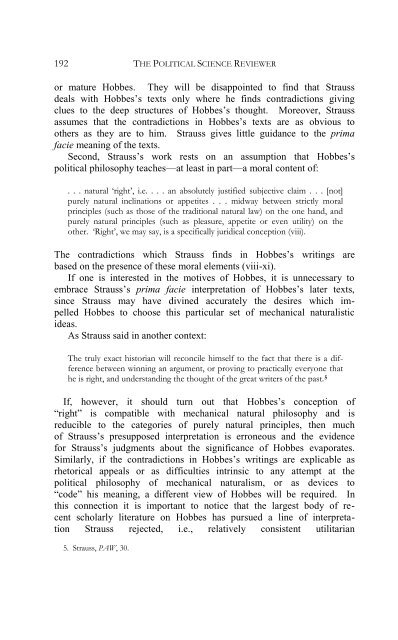Strauss and Watkins on Hobbes' Political Philosophy: A Review
Strauss and Watkins on Hobbes' Political Philosophy: A Review
Strauss and Watkins on Hobbes' Political Philosophy: A Review
You also want an ePaper? Increase the reach of your titles
YUMPU automatically turns print PDFs into web optimized ePapers that Google loves.
192 THE POLITICAL SCIENCE REVIEWER<br />
or mature Hobbes. They will be disappointed to find that <str<strong>on</strong>g>Strauss</str<strong>on</strong>g><br />
deals with Hobbes’s texts <strong>on</strong>ly where he finds c<strong>on</strong>tradicti<strong>on</strong>s giving<br />
clues to the deep structures of Hobbes’s thought. Moreover, <str<strong>on</strong>g>Strauss</str<strong>on</strong>g><br />
assumes that the c<strong>on</strong>tradicti<strong>on</strong>s in Hobbes’s texts are as obvious to<br />
others as they are to him. <str<strong>on</strong>g>Strauss</str<strong>on</strong>g> gives little guidance to the prima<br />
facie meaning of the texts.<br />
Sec<strong>on</strong>d, <str<strong>on</strong>g>Strauss</str<strong>on</strong>g>’s work rests <strong>on</strong> an assumpti<strong>on</strong> that Hobbes’s<br />
political philosophy teaches—at least in part—a moral c<strong>on</strong>tent of:<br />
. . . natural ‘right’, i.e. . . . an absolutely justified subjective claim . . . [not]<br />
purely natural inclinati<strong>on</strong>s or appetites . . . midway between strictly moral<br />
principles (such as those of the traditi<strong>on</strong>al natural law) <strong>on</strong> the <strong>on</strong>e h<str<strong>on</strong>g>and</str<strong>on</strong>g>, <str<strong>on</strong>g>and</str<strong>on</strong>g><br />
purely natural principles (such as pleasure, appetite or even utility) <strong>on</strong> the<br />
other. ‘Right’, we may say, is a specifically juridical c<strong>on</strong>cepti<strong>on</strong> (viii).<br />
The c<strong>on</strong>tradicti<strong>on</strong>s which <str<strong>on</strong>g>Strauss</str<strong>on</strong>g> finds in Hobbes’s writings are<br />
based <strong>on</strong> the presence of these moral elements (viii-xi).<br />
If <strong>on</strong>e is interested in the motives of Hobbes, it is unnecessary to<br />
embrace <str<strong>on</strong>g>Strauss</str<strong>on</strong>g>’s prima facie interpretati<strong>on</strong> of Hobbes’s later texts,<br />
since <str<strong>on</strong>g>Strauss</str<strong>on</strong>g> may have divined accurately the desires which im-<br />
pelled Hobbes to choose this particular set of mechanical naturalistic<br />
ideas.<br />
As <str<strong>on</strong>g>Strauss</str<strong>on</strong>g> said in another c<strong>on</strong>text:<br />
The truly exact historian will rec<strong>on</strong>cile himself to the fact that there is a dif-<br />
ference between winning an argument, or proving to practically every<strong>on</strong>e that<br />
he is right, <str<strong>on</strong>g>and</str<strong>on</strong>g> underst<str<strong>on</strong>g>and</str<strong>on</strong>g>ing the thought of the great writers of the past. 5<br />
If, however, it should turn out that Hobbes’s c<strong>on</strong>cepti<strong>on</strong> of<br />
“right” is compatible with mechanical natural philosophy <str<strong>on</strong>g>and</str<strong>on</strong>g> is<br />
reducible to the categories of purely natural principles, then much<br />
of <str<strong>on</strong>g>Strauss</str<strong>on</strong>g>’s presupposed interpretati<strong>on</strong> is err<strong>on</strong>eous <str<strong>on</strong>g>and</str<strong>on</strong>g> the evidence<br />
for <str<strong>on</strong>g>Strauss</str<strong>on</strong>g>’s judgments about the significance of Hobbes evaporates.<br />
Similarly, if the c<strong>on</strong>tradicti<strong>on</strong>s in Hobbes’s writings are explicable as<br />
rhetorical appeals or as difficulties intrinsic to any attempt at the<br />
political philosophy of mechanical naturalism, or as devices to<br />
“code” his meaning, a different view of Hobbes will be required. In<br />
this c<strong>on</strong>necti<strong>on</strong> it is important to notice that the largest body of re-<br />
cent scholarly literature <strong>on</strong> Hobbes has pursued a line of interpreta-<br />
ti<strong>on</strong> <str<strong>on</strong>g>Strauss</str<strong>on</strong>g> rejected, i.e., relatively c<strong>on</strong>sistent utilitarian<br />
5. <str<strong>on</strong>g>Strauss</str<strong>on</strong>g>, PAW, 30.
















